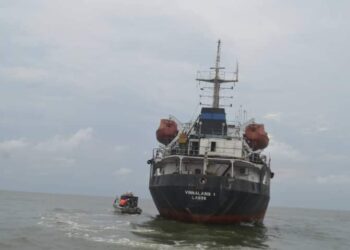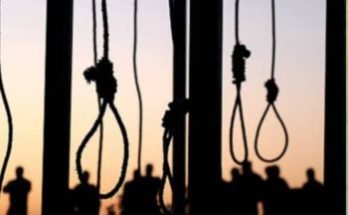Oil theft, presently and notoriously glamourised as illegal oil bunkering, started under the military regime. The first barrel of oil was drilled in Oloibiri, Bayelsa state in 1956. Ten years later, Nigeria went into a civil war which lasted till 1970. Yakubu Gowon, a General, was the military Head of State of Nigeria till 1975 when he was overthrown in a military coup d’etat.
Oil theft first appeared in Nigerian law in 1975. The Petroleum Production and Distribution (Anti-Sabotage) Act 1975 mentions pipeline sabotage and provides penalties, including the death penalty for offenders, but at this time, the focus was pipelines conveying petroleum products, not crude oil. The possibility of crude oil theft emerged in 1984 and the deterrent appeared in The Crude Oil (Transportation and Shipment) Regulation 1984.
This law targeted ships, tankers and vessels engaging in unauthorised loading of crude oil within Nigeria or outside any loading ports or terminals in Nigeria.
From this shadowy possibility in 1984, oil theft became a logical reality during Ibrahim Babangida’s regime in 1987/88. A professor of Virology and then minister of petroleum and energy, Tam David West, estimated that Nigeria was losing N10 million annually to crude theft.
A prince of Kula Kingdom, a riverine oil-producing community in Rivers state, Anabs Sara Igbe, has been monitoring oil theft for years. He said oil theft gathered substantial critical mass during the military regime of Sani Abacha. Indeed, he sees Abacha’s regime as the beginning of oil bunkering in the Niger Delta, as it is known today.
The genesis of oil theft
Sara Igbe traced it to when Abacha called out Nigerian youths for the Two-Million-Man March organised by Daniel Kanu to drum up support for his self-succession plan under the vehicle of Youths Earnestly Ask for Abacha (YEAA).
Sara Igbe said, “Niger Delta youths couldn’t understand what it means that their development was in the pipeline; so they started breaking the pipeline and found crude oil.
“During the march, they saw money; they saw Abuja; they came home to the Niger Delta and demonstrated. The Nigerian government told them the development of the Niger Delta was in the pipeline! They couldn’t understand what it meant that their development was in the pipeline. So they broke the pipeline and saw crude oil. Black gold! That was how they started, in a small way, until the cartel came and high-jacked it from them. That is where we are,” recalled Sara Igbe.
By 2013, the Goodluck Jonathan administration put the volume of crude losses at about 150,000 barrels per day. On August 29 2019, the Ad-Hoc Committee of the National Economic Council (NEC) on Crude Theft revealed that Nigeria lost about 22 million barrels in the first six months of that year. The cost was put at $1.35 billion. That was the equivalent of five per cent of the year’s budget. According to NEITI, between 2009 and 2019, Nigeria lost 138.4 thousand barrels of crude oil every day, representing seven per cent of average production of two million b/d.
According to NEITI, between 2009 and 2018, Nigeria lost over 505 million barrels of crude oil valued at $40.06 billion and 4.2 billion litres of refined petroleum products worth $1.84 billion respectively, making a total of $41.9 billion. This means that on the average, Nigeria lost $11.47 million daily, $349 million monthly, and $4.2 billion dollars every year for the 10 years.
In the 2020 budget speech at the National Assembly, President Muhammadu Buhari revealed that oil revenues fell below target by 49 per cent as of June 2019. He attributed this to what he referred to as, “lower than projected oil production, deductions for cost under-recovery on supply of premium motor spirit (PMS) as well as higher expenditures on pipeline security/ maintenance.”
NEITI reveals that, “Pipeline repairs, a direct consequence of vandalism, is a major index of losses in the oil industry. For three years covering 2014-2016, total expenditure on pipeline repairs was N363 billion.”
Put together, NEITI says that between 2009 and 2018, a total of 488,558,873 barrels (488.6 million barrels) of crude oil was lost to theft and sabotage. The agency observes, “One pattern that seems to occur with disturbing regularity is the sudden spike in volume of losses after two to three periods of comparable values. These extraordinarily high volumes occurred in 2009, 2013 and 2016.”
Crude oil losses declined to 32.5 per cent between 2014 and 2015 but spiked to the highest percentage increase of 272.6 per cent between 2015 and 2016. This period was described by NEITI as a period of heightened sabotage activity in the oil producing region. The agency equally noted that, “The fact that the lowest percentage change was above 30 per cent shows the high volatility in crude oil losses.”
NEITI figures may be well below the actual volume of crude oil Nigeria is losing daily. Sara Igbe puts the loss to about one million barrels daily. He should know better. He lives in the creeks. He knows the spread of the pipelines and the futility of surveillance by compromised security operatives.
Dimensions of oil theft
A retired Rear Admiral and former Commander of the Eastern Naval Command of the Nigerian Navy, A.I. Bob-Manuel, when MT African Pride, an all foreign crew standard oil tanker, was arrested on October 8, 2003, describes the dimensions of oil theft as, “The Iniquitous Triad.”
This triad underlies the modus operandi of the oil thieves. According to him, they operate through a complex network of pipelines, deep in the creeks and rivers of the Niger Delta. It involves a triple relay division of labour which benefits all stakeholders in the business.
The first group are those who specialise in the vandalisation of pipelines and the evacuation of their content into barges for subsequent transfer into coastal tankers. The barges characteristically have carrying capacities of between 50 –500 metric tons and are said to be suitable for the movement of cargo in the narrow-confined waters of the creeks.
“This is the home of the domain of the so-called cultists, political thugs, militants and other social misfits that have been terrorising both inland and off-white waters of the Niger Delta. Their campaign of terror is funded mainly from the proceeds of stolen crude oil,” revealed Bob-Manuel.
The second group, he said, receives the stolen crude cargo from the barges. Operators at this level use seagoing coastal tankers or self-propelled barges to receive the stolen crude from the barges for subsequent transhipment into much larger vessels.
“The coastal tankers/self-propelled barges are usually stationed at anchorage positions in the inland waters of the Niger Delta from where they are rendezvoused by the barges. They typically have carrying capacities of 1500 – 5000 metric tons and because they spend much time anchored in the inland waters, they are more susceptible to arrest,” says Bob-Manuel.
Most of the arrests made by the Nigerian Navy belong to this category of vessels. Here, the operators are mainly Nigerians acting alone or stealing in concert with foreign accomplices.
The third group, according to him, wait in predetermined positions out in the open sea to receive the contents of coastal tankers. Operators here employ standards and in some reported cases, even supertankers, to transship the stolen crude contents from relatively smaller coastal tankers to refineries in different parts of the world. The carrying capacity of these outsized vessels range from 25mt for standard tankers to over 100,000 mt for super tankers.
mt for super tankers.
On October 8, 2003, MT African Pride, a standard oil tanker, was arrested by the Nigerian Navy Ship (NNS) NWAMBA under the command of a Captain, Joe Aikhomo, in the Western Naval Command of Nigeria Navy, off the entrance to the Forcados River in Delta state. It was the largest ship ever arrested. All the crew were foreigners. At the time of arrest M.T. African Pride had 11, 300 MT of stolen crude oil cargo worth ₦10 billion Naira.
Bob-Manuel says his disclosure on MT African Pride is an attempt to give a truthful and honest account of events as they occurred; to highlight the deceit in a seriously flawed and contrived administration process that has cost Nigeria so dearly and to appeal, with the deepest sense of humility and concern, for the matter to be revisited.
At the time of arrest, The MT African Pride had 11,300 mt of stolen crude cargo on board, valued by petroleum industry experts to be $70 million or ₦10 billion then. Bob-Manuel said the supertankers have over four times the carrying capacity of The MT African Pride which had made three previous trips before her arrest on October 8, 2003, from the recording on its logbook. It had 22 crew members made up of 18 Russians, two Romanians and two Georgians
ICIR




